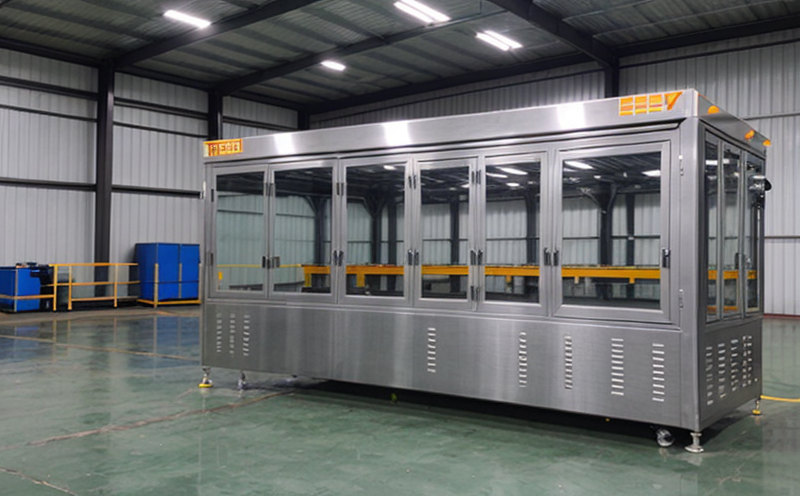ASTM B209 Aluminum Sheet Testing
The ASTM B209 standard specification covers aluminum sheets that are suitable for use in the manufacture of containers and closures. This test is critical in ensuring that metal packaging meets the stringent quality, strength, and durability requirements necessary for safe food and beverage storage.
Aluminum packaging plays a significant role in modern manufacturing due to its lightweight, recyclable nature, and excellent barrier properties against oxygen, moisture, and other gases. However, to ensure that these materials perform optimally during their lifecycle, rigorous testing is essential. ASTM B209 aluminum sheet testing focuses on mechanical properties such as tensile strength, yield strength, elongation, and formability.
The testing process involves several steps. Initially, the sample preparation includes cleaning, trimming, and ensuring that the surface of the metal sheets meets specific dimensions. The specimens are then subjected to various mechanical tests using specialized equipment like universal testing machines (UTMs). These tests evaluate how the material behaves under different loading conditions.
For instance, tensile testing measures the maximum stress a sample can withstand before breaking. Yield strength indicates at what point deformation begins permanently. Elongation assesses the flexibility of the metal by measuring the percentage increase in length during stretching until fracture. Additionally, formability tests determine how easily the material can be shaped into different forms without losing its integrity.
The results from these tests are compared against the standards outlined in ASTM B209 to ensure compliance with industry best practices. Compliance is crucial not only for product safety but also for meeting regulatory requirements and ensuring brand reputation. Non-compliance could lead to recalls, costly repairs, or even legal action.
Moreover, understanding how aluminum behaves under various conditions helps R&D engineers innovate new packaging solutions that better meet consumer needs while maintaining sustainability goals. By adhering strictly to ASTM B209 standards, manufacturers can demonstrate their commitment to quality and safety, which is increasingly important in today's competitive market.
In summary, ASTM B209 aluminum sheet testing ensures that metal packaging meets the highest level of performance expectations set forth by industry leaders. Through this rigorous process, we help our clients produce safer, more reliable products while fostering trust among consumers and stakeholders alike.
Why It Matters
The importance of ASTM B209 aluminum sheet testing cannot be overstated as it directly impacts the safety and integrity of packaged goods. Ensuring that metal packaging meets these stringent requirements helps protect consumers from potential risks associated with compromised packaging.
From a manufacturing perspective, adhering to these standards guarantees consistent product quality across different batches and locations. This consistency is vital for maintaining brand reputation and customer satisfaction. Furthermore, compliance reduces the likelihood of recalls due to faulty packaging, thereby saving companies time and resources.
In terms of sustainability, testing ensures that materials are used efficiently without compromising their effectiveness. Efficient use of raw materials contributes positively towards reducing waste and lowering carbon footprints. This aligns with broader corporate social responsibility (CSR) initiatives aimed at promoting environmental stewardship.
From a regulatory standpoint, compliance with ASTM B209 helps companies avoid penalties for non-compliance. Regulatory bodies worldwide are increasingly focusing on ensuring that products meet certain safety standards. Non-compliance can result in fines, product seizures, or even bans from selling the affected items within specified markets.
In conclusion, ASTM B209 aluminum sheet testing is not just a technical requirement; it's an essential step toward maintaining high-quality standards and contributing to safer, more sustainable packaging solutions.
Why Choose This Test
Selecting the appropriate test for your metal packaging needs can significantly impact the quality and safety of your final product. ASTM B209 aluminum sheet testing provides several advantages over other methods:
1. Comprehensive Evaluation: Unlike simpler tests, ASTM B209 offers a holistic evaluation of multiple key characteristics including tensile strength, yield strength, elongation, and formability.
2. Industry Recognition: Being an internationally recognized standard, compliance with ASTM B209 adds credibility to your brand and products in the eyes of consumers and regulatory bodies alike.
3. Consistency Across Batches: By ensuring that every batch meets these stringent criteria, you maintain consistent quality throughout production runs.
4. Regulatory Compliance: Meeting ASTM B209 requirements helps avoid potential fines or product seizures by regulatory authorities.
5. Enhanced Safety: The rigorous testing process ensures that any defects are identified early in the manufacturing cycle, preventing them from reaching end-users.
6. Sustainable Practices: Efficient use of raw materials through precise testing contributes to reduced waste and lower environmental impact.
In choosing ASTM B209 aluminum sheet testing, you invest in long-term reliability and safety for your products, which ultimately benefits both your business and the environment.
Environmental and Sustainability Contributions
The use of ASTM B209 aluminum sheet testing aligns closely with broader sustainability goals. Aluminum is highly recyclable, making it an ideal material for sustainable packaging solutions. However, ensuring that this metal meets rigorous quality standards is equally important to maintaining its environmental benefits.
By adhering strictly to ASTM B209 guidelines during manufacturing processes, companies can ensure that aluminum used in packaging is not only safe but also as efficient and eco-friendly as possible. This approach supports circular economy principles by promoting the reuse of materials rather than disposing of them after a single use.
The testing process itself plays an indirect role in sustainability efforts too. For example, accurate measurements help manufacturers minimize waste during production, leading to less raw material consumption overall. Additionally, knowing precisely how much metal is needed for each package allows businesses to optimize packaging designs further reducing unnecessary resource extraction.
Moreover, when consumers recycle aluminum cans and containers properly, they contribute positively towards closed-loop systems that reduce landfill waste and conserve natural resources like bauxite ore used in primary aluminum production. Thus, ASTM B209 testing contributes indirectly but importantly to overall environmental sustainability goals.





